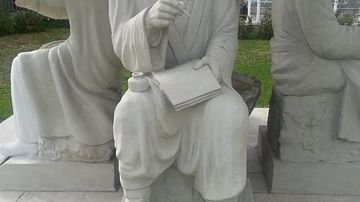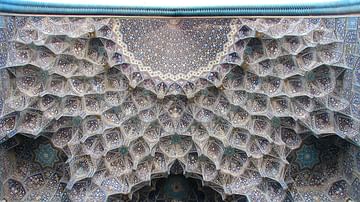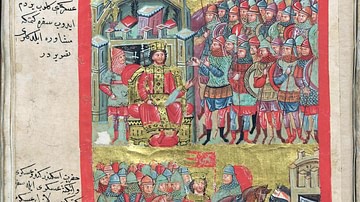Search
Did you mean: The Dagda?
Search Results

Definition
Hausaland
Hausaland, sometimes referred to as the Hausa Kingdoms, was a group of small independent city-states in northern central Africa between the Niger River and Lake Chad which flourished from the 15th to 18th century CE. The origins of the Hausa...

Definition
Ancient Jordan
Jordan is a country in the Near East bordered by Israel, Syria, Iraq, and Saudi Arabia. The country's name comes from the Arabic Al Urdun, referencing a fortified site but also meaning "prominence", though various sources also claim the name...

Definition
Children's Crusade
The so-called Children's Crusade of 1212 CE, was a popular, double religious movement led by a French youth, Stephen of Cloyes, and a German boy, Nicholas of Cologne, who gathered two armies of perhaps 20,000 children, adolescents, and adults...

Definition
Jerash
Jerash (aka Gerasa, Gerash or Gerasha) is the capital and the largest city of the Jerash Governorate in Jordan, but in ancient times it was one of the wealthiest and most cosmopolitan cities in the ancient Near East. Settled by humans as...

Definition
Omar Khayyam
Omar Khayyam (also given as Umar Khayyam, l. 1048-1131 CE) was a Persian polymath, astronomer, mathematician, and philosopher but is best known in the West as a poet, the author of The Rubaiyat of Omar Khayyam. His famous work has been embraced...

Definition
Muqarnas
Muqarnas is a three-dimensional architectural decorative element that flourished in its most complete form mainly during the Islamic period and is most pervasively used in domes and semi-domes. One of the key features of this mesmerizing...

Definition
Abd al-Rahman III
Abd al-Rahman III was an Umayyad prince who reigned as Emir of Cordoba, and later Caliph of Cordoba, from 912 to 961 CE. His reign is remembered as a golden age of Muslim Spain and Umayyad rule, epitomized by his declaration of the second...

Definition
Möngke Khan
Mongke Khan was ruler of the Mongol Empire (1206-1368 CE) from 1251 to 1259 CE. As the third Great Khan or 'universal ruler' of the Mongols, Mongke would oversee administrative reforms that continued to centralise government and ensure he...

Definition
Parthian Religion
Parthian religion might be best described with two words: inclusive and evolving. As Parthia's empire held within it a variety of cultures, the Parthians wisely left each to their own beliefs and traditions, like the Seleucid Empire and the...

Definition
Empire of Trebizond
The Empire of Trebizond was an offshoot of the Byzantine Empire that existed from 1204 to 1461 CE, ruled by the Megas Komnenos Dynasty, descendants of the Komnenos Byzantine emperors. The Empire of Trebizond has been far less researched than...